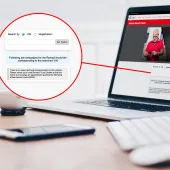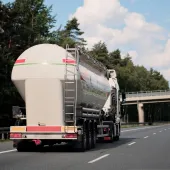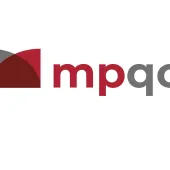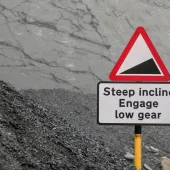Transport Safety

First published in the June 2017 issue of Quarry Management
Driving forward the extractives industry and reducing the risks posed by HGVs and other workplace transport
In 2015/16 the Health and Safety Executive (HSE) reported that 19% of all workplace fatalities were caused by moving vehicles1. Workplace transport continues to be one of the highest safety risks within the extractives industry. With this in mind, improving transport safety has long been a key initiative for both industry employers and other key stakeholders, such as the Mineral Products Qualifications Council (MPQC) and the Mineral Products Association (MPA).
In 2014 the European Union introduced the Driver Certificate of Professional Competence (CPC) for all professional HGV drivers across Europe, with the aim of improving road safety and maintaining high standards of driving; all HGV drivers must now undertake 35h of professional training every five years in order to maintain their Driver CPC.
The HSE provides all employers with further advice on workplace transport structured into three areas: safe site, safe vehicle and safe driver2. However, both employers and organizations such as MPQC and the MPA are keen to pave the way for other sectors in terms of ‘zero harm’ and are building on this by providing their hauliers with more than just simple advice and basic training courses.
Dominic Day, from Day Aggregates, explained: ‘The focus for Day Aggregates is the quality of the drivers and their ongoing management. This is about recruiting the right people, good inductions, reviewing performance during their probation periods, annual appraisals (in the form of driving tests) and so on. We are especially proud of our RoSPA-accredited driving assessors who visit drivers at each and every site, so the standard of appraisal is consistent across the whole business. Healthy salaries, a great working environment and strict disciplinary processes combine to good effect.’
MPQC is a not-for-profit membership organization run by industry, for industry. Its training division, MP Skills, is one of the industry’s leading training providers and supplies employers with a wide range of unique and interactive training courses. It currently offers two JAUPT-approved Driver CPC courses (with two more launching later this year) and says feedback from hauliers who have attended these courses has been exceptional. Driver Arron Shore said: ‘[This was] by far the most engaging and informative course I’ve attended so far. The trainer delivered the material in such a way that the whole room hung on his every word. I came away with lots to think about and I know I’m not the only one.’
MP Skills also manage the Driver Skills Card scheme on behalf of the aggregates sector. The majority of employers within the sector are members of the MPA and, consequently, support the Driver Skills scheme – this means that hauliers who do not hold this card are unable to enter a large proportion of industry sites because they are unable to demonstrate that they have the required level of training to deal with the issues that are specific to the mineral products sector. Employers in the sector have confidence in drivers who have been trained by MP Skills because it employs trainers who have both real industry experience and a reputation for providing high-quality course material that covers a wide range of key industry issues. Testament to this, MP Skills have delivered more than 27,000 Driver Skills Cards since 2013, which means there are a lot of safer drivers out there.
However, MPQC says what makes MP Skills really stand out from other training providers is that it actively encourage employers to make contact in order to work together to develop training courses that reflect the specific needs of employers and employees within the extractives industry. For example, in 2016 Hope Construction Materials (now part of Breedon Group) approached MP Skills to design and develop a course that would give their supervisors/managers a comprehensive overview of the legislation and pressures of being a haulier within the industry. The resulting course, ‘Effective Management of Hauliers’, produced extremely positive results for Hope and is now being rolled out by MP Skills to the entire industry.
Nicola Wood, talent and development manager at Breedon Group, explained: ‘Knowing MP Skills’ fantastic track record for delivering informative, energetic and relevant training, we were convinced that they were the right partner to work with on the management of haulier training. Feedback from all the delegates was extremely positive – not only did they learn aspects of haulier management that they did not appreciate, but they could also put it into practice the very next day.’
Another key course that has recently been launched for hauliers is ‘Logical Logistics – Essential Skills for the Modern Day Haulier’. Again, this course is JAUPT approved and is designed to equip drivers with the essential skills needed to deal with everyday issues/situations, as well as focusing on driver ‘health’ and ‘safety’.
If proof was ever needed to demonstrate how vital it is that drivers are equipped with essential everyday skills, the following is what happened to quick-thinking haulier John Campsall when a member of the public was thrown from her horse.
Suspecting the lady had broken her back, the driver for Tarmac’s Rotherham haulier, D Howe Haulage, called an ambulance and administered first aid. As a former community first-responder for Yorkshire Ambulance Service and having kept up to date with workplace first-aid courses, Mr Campsall knew the injured lady risked doing far more damage to her spine if she was not immobilized. ‘She stood up to catch the horse but collapsed in agony. I made her understand it was vital she kept still, and then helped get her in the ambulance on a spinal board,’ he explained.
The lady, who had actually fractured her spine in two places, later said: ‘John was marvellous and absolutely right. I was told in hospital it was a very bad break and without his knowledge and quick thinking I could have done far more serious damage. I can’t thank him enough.’
With the nature of the extractives industry, workplace transport will long continue to be one of the biggest risks to safety. However, it is clear to see that both employers and other organizations within the sector are working together to tackle and reduce these risks wherever possible. The question you need to ask is; how can you and your employer help to ensure hauliers and vulnerable road users go home safely at the end of each day?
References
Some easy ways to begin improving transport safety in your workplace
- Visit www.safequarry.com for useful safety advice
- Download the MPA’s Sharing Good Practice Guide
- Download the MPA’s Driver Handbook
- Visit: www.mpskills.co.uk to view the range of SHE and Driver Skills courses
- Contact MP Skills to discuss your business needs and get advice tailored to your specific requirements.
• Subscribe to Quarry Management, the monthly journal for the mineral products industry, to read articles before they appear on Agg-Net.com








